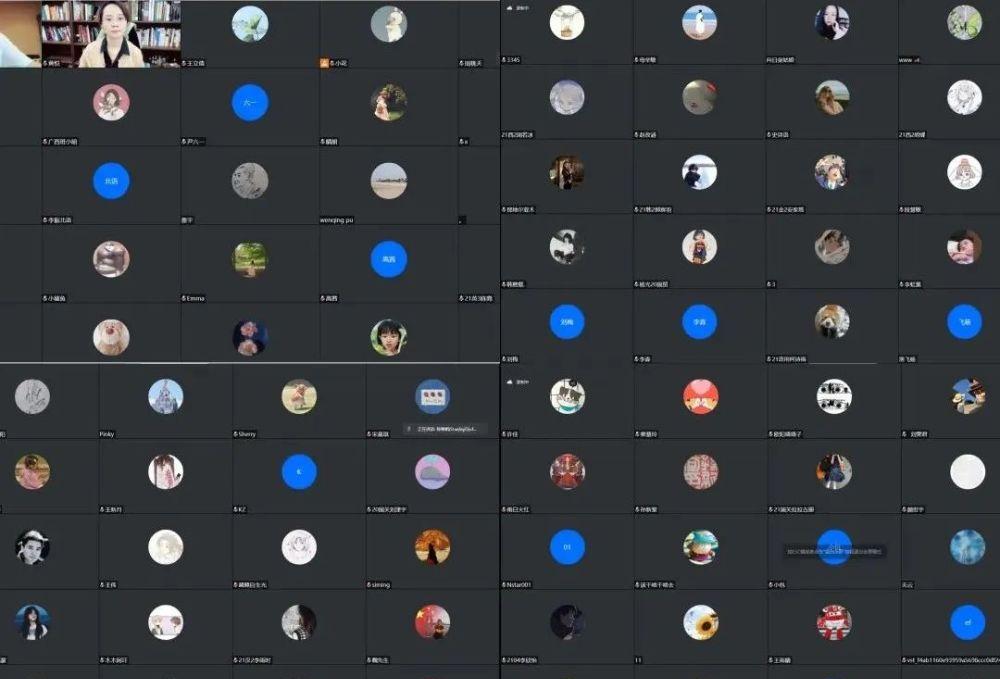At 9:00 a.m. on March 18, 2022, the online class of "China Writers Open Class" welcomed a speech entitled "The New Wave and Future of Chinese Science Fiction" by Chen Qifan, a famous science fiction writer, translator and deputy director of the Science Fiction Literature Committee of the China Writers Association. The course was hosted by Professor Huang Yue of Beijing Language and Culture University, and Jin Xueni, a doctoral student in the Department of East Asian Studies of Yale University and a literary translator, participated in the online dialogue, and more than 100 teachers and students participated in the course online.

At the beginning of the course, Professor Huang Yue first introduced the development process of Chinese science fiction and its overseas influence, she focused on the analysis of the contemporary literary phenomenon known as the "New Wave of Chinese Science Fiction" (Song Mingwei) in terms of the characteristics of writer identity, translation mode, communication channels, etc. Professor Huang Yue introduced that as a post-80s writer who grew up in the nourishment of Chinese and foreign cultures, Chen Yufan's creative process and works are a typical sample, and 37 of his works have been translated into a variety of foreign language versions, and the representative work "Wild Tide" has been successfully exported including English 10 countries such as German and Spanish copyrights, and their film and television adaptation rights have also attracted much attention from the international market. This not only reflects the author's own creative achievements, but also relies on the success of translation, and provides a window for us to understand the cross-cultural and cross-media communication of contemporary literature.
Chen's speech started from his personal growth experience and made a contextualized and historic restoration of the development process of Chinese science fiction. He pointed out that understanding Chinese science fiction can not be separated from the perspective of cultural exchange, today's rapid development of China provides a good soil for the development of science fiction, people's openness and tolerance of emerging technologies and the rapidly changing context of reality are the reasons why "science fiction realism" can stand, in this sense, science fiction has completed the docking with traditional classical literature, and written and discussed the postmodern and post-human states that are happening or may occur.
Chen Xifan took "The Wandering Earth" as an example to illustrate the historical dynamics behind the new wave of Chinese science fiction climax: in the context of the rise of comprehensive national strength, the Chinese people began to seek subjectivity and discourse power, showing the process of science fiction from the edge to the center of the stage, in this process, Chinese science fiction writers also tried to seek a breakthrough in a group way, in the hope that the peak of Chinese science fiction can become a continuous wave.
Finally, from the creative practice of his own works, Chen Yufan pointed out that science fiction literature naturally has a state of intersubjectivity, which can promote the flow, transformation, exchange and understanding between different subjects. Science fiction literature as a narrative art of literature, both enchanted and disenchanted, both humanistic and scientific, which is the charm and interest of its fluidity.
In this sense, science fiction may be the most cognitive and emotionally capable of establishing a literary form that transcends anthropocentrism, transcends dualistic oppositions, and transcends cognitive limitations, constantly breaking human cognition of existing subjectivity, constantly throwing human beings into a defamiliarized environment, allowing readers to see the world from a perspective that is different from everyday life or even non-human, so as to obtain an identity and empathy of others.
In the dialogue session, Chen Xueni, Ph.D. and science fiction translator in the Department of East Asian Literature and Literature at Yale University, focused on three aspects: the fluidity of translation, translation as a method, and the future direction of translation. First of all, Jin Xueni pointed out that from the standpoint of world literature, translation is a necessary intermediary for literary exchange, and it is even possible to establish a two-way interactive relationship with the author.
At the same time, Jin Xueni pointed out in combination with her own translation practice that in the translation and dissemination of science fiction novels, it is also necessary to emphasize subjectivity and also pay attention to avoid falling into the misunderstanding of self-orientalization. Finally, Jin Xueni focused on her understanding of Chen's science fiction works and her ability to translate them. She spoke highly of Chen's works and analyzed the characteristics of the suspension of subjects and intersubjectivity in Chen's works. Jin Xueni believes that translated literature, as a cultural intermediary, will continue to adjust itself and embrace a fluid and open future.
In the final interactive session, the students raised questions about the literary nature of AI writing, the original plot of science fiction writers, and the possibility of Chinese science fiction going to the global market. Chen Once again stressed that we should strive to get rid of binary opposition, either-or value judgments, and also pointed out that science fiction may be a cultural product that breaks the unequal status quo. Jin Xueni complements the trend of developing the history of science fiction research and analyzes the different modes of multilingual output of science fiction works. Finally, Chen Also shared his experience in cooperating with overseas publishing circles and shared valuable experiences in literary translation.
This semester, the China Writers Open Class will continue to cooperate with Novel Monthly, inviting influential writers and critics from contemporary China to enter the classroom and engage in dialogue with readers and translators at home and abroad, inside and outside the classroom, to build an active communication platform for Chinese literature to "go global", and to contribute to improving the literary literacy and cross-cultural communication ability of students at Beijing Language and Culture University.